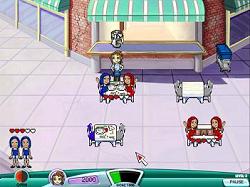


As the game progresses, Flo updates the dilapidated restaurant she begins with and builds three further restaurants, which provide new settings. Each level has a goal for money, or points, that the player must achieve. Gameplay involves seating customers and guiding Flo around the restaurant to serve customers. She prepares to fly down, intent on turning him into a waiter similar to what happened to her. The goddess then flies away to the Indian Restaurant and Flo spots a young man below working in the same business job she had at the start of the story. Flo completes the 10 grueling trials and is congratulated by the goddess for completing the trials. The goddess transforms Flo into a golden banquet goddess with 4 arms, allowing her to carry double the amount she could before. Here, a Shiva Goddess welcomes her and challenges her to ten trials inside her own restaurant, the Indian Restaurant. She then goes on to buy a seaside diner called Go with the Flo Seafood Dining and an elegant restaurant in an opening of dark and shriveled trees called Chez Flo.Īfter having the intuition that something special will happen, Flo finishes up her work in Chez Flo and is immediately transported above the clouds.

Later, after earning more money, she opens a new restaurant called Flo's Tiki Palace. She has to make enough money to fix up the diner. She spots a rundown old diner, which she buys. Flo finally quits her job, wishing she could work someplace else. She's tired of doing all the work and feeling unfulfilled. Unlike most trial games, this one won’t expire.Flo is a hard worker at a big stock market company in Dinertown. “It’s a really limited business model,” said David Cole, an analyst with DFC Intelligence in San Diego.Īlthough consumers can buy a full, 50-level version of “Diner Dash: Hometown Hero” for $20, PlayFirst is also offering them the chance to download a version with seven levels without having to pay a dime. But the model has a flaw: For the average casual game, just 2 percent of the people who download it end up buying the full version. The business model has been successful enough that the casual games industry has been one of the hottest sectors in video games in recent years. If they want to keep on playing, they have to buy the full version of the game for about $20. Customers download its games from the PlayFirst or other casual games Web sites and can play them for 30 to 60 minutes. Like many companies in the burgeoning casual games space, San Francisco-based PlayFirst has built a business around the try-before-you-buy business model. So when game developer PlayFirst decided last month to offer a free, non-expiring version of the latest edition of a franchise that has seen 200 million downloads, it was something of a bold move. “Diner Dash” is something like the “Halo” of the online casual games market.


 0 kommentar(er)
0 kommentar(er)
